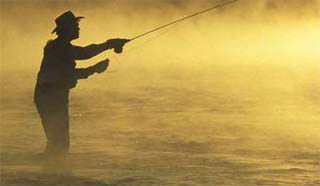
Before the court ruling, Utah anglers could only fish on those streams with the landowner’s permission. Ed Kent, chair of the Utah Anglers Coalition, welcomed the court ruling, declaring: “This is going to open corridors of extremely productive waters to anglers.” Reports from the first anglers to exercise their new rights are showing up online. One happy sportsman wrote: God bless the Utah Supreme Court, I caught some gigantic brown trout today on a section of river I’ve never been able to fish until now! Yee haw!” Anglers are enjoying the tremendous fishing opportunities available on streams that have been carefully managed and conserved over the years by private landowners. Unfortunately, those opportunities will disappear as landowners stop investing their time and money in the streams crossing their property. The great conservationist Aldo Leopold explained it this way: “Conservation will u1timately boil down to rewarding the private landowner who conserves the public interest.”
I visited the kind of landowner Leopold extolled. He owns 1,800 acres of rural Utah land that includes 1.8 miles of stream. When he purchased the property seven years ago, the banks of the creek had been grazed down to the point where there were no river birches, willows, or cottonwoods. Stream banks were eroded and there was little stream complexity, a necessary ingredient for a fruitful fishery. This landowner spent thousands of dollars and hours restoring the creek to create a productive trout fishery. He fenced the cows away from the stream. He sought expert advice on how to help the stream heal itself. He made stream barbs of rocks that stick out from the b an k s to create eddies, protect banks from erosion, and change water depth and velocity.
Today river birches, willows, cottonwoods, and tall grasses are growing along the banks, a gravel bed suitable for spawning has emerged, and the fish love it.
The landowner’s son planned to buy the adjoining property and over time double the amount of restored creek. Now, all plans are off. If he and his father cannot protect the habitat they create and the fish that thrive there, they are not going to spend anything at all.
Instead of doing back flips over the court decision, anglers should be asking the Legislature to change the state code on which the decision was based so that landowners will once again have an incentive to restore and enhance streams on their properties. Otherwise, who is going to fence cows away from the water? Who is going to pay for stream barbs and planting willows? Governments may help on portions of major waterways like the Provo Rive r, but what about all the little creeks that could be as productive as the one I saw?
Many anglers understand the value and potential of private conservation and want to encourage it. The stream access court decision does the opposite. Productive streams crossing private property will be quickly fished out, as has already happened a few miles below the property I described. Let’s hope legislators will work with anglers and property owners to avoid this potential tragedy.
This editorial originally appeared in the Salt Lake Tribune on September 14, 2008.



